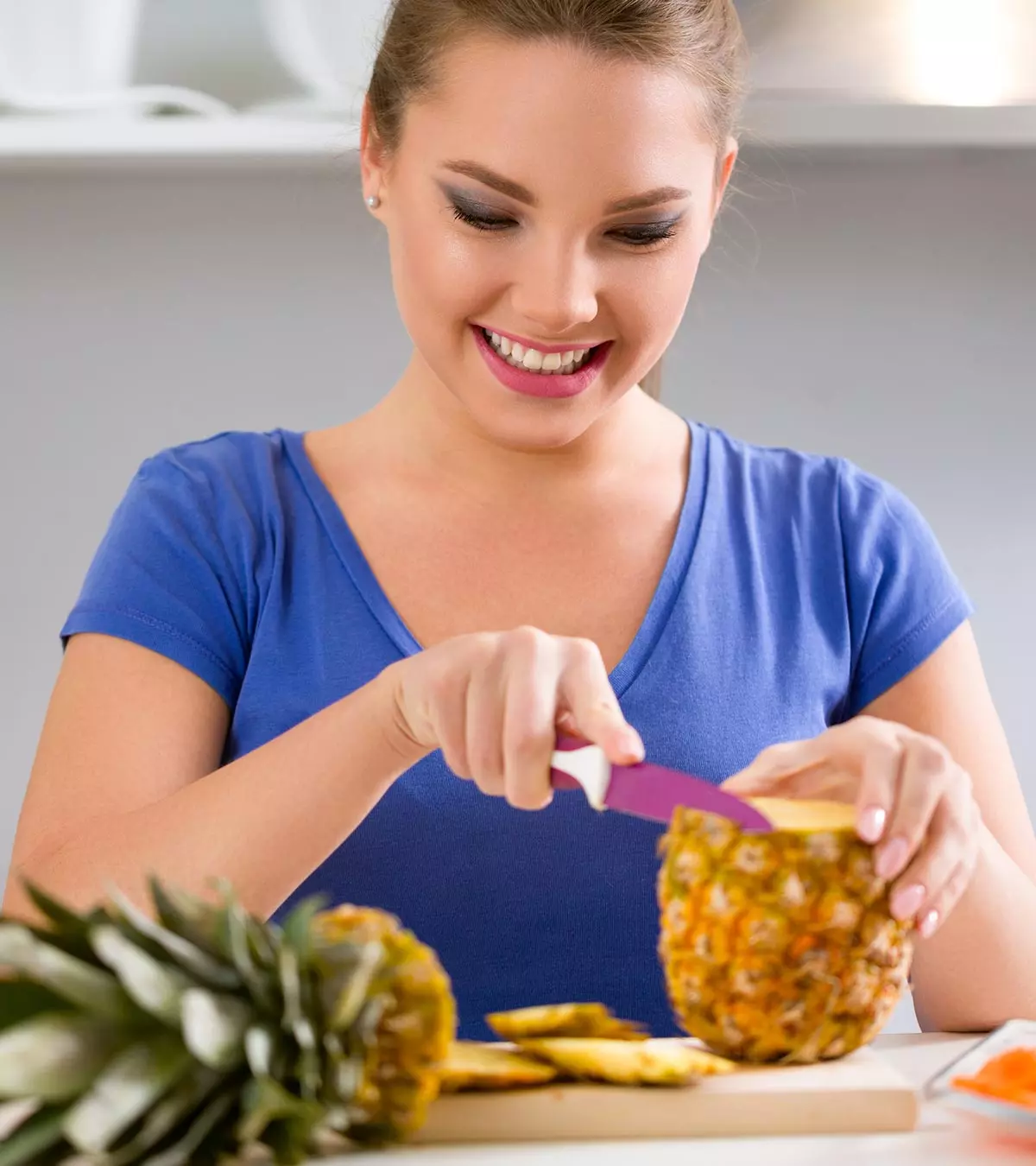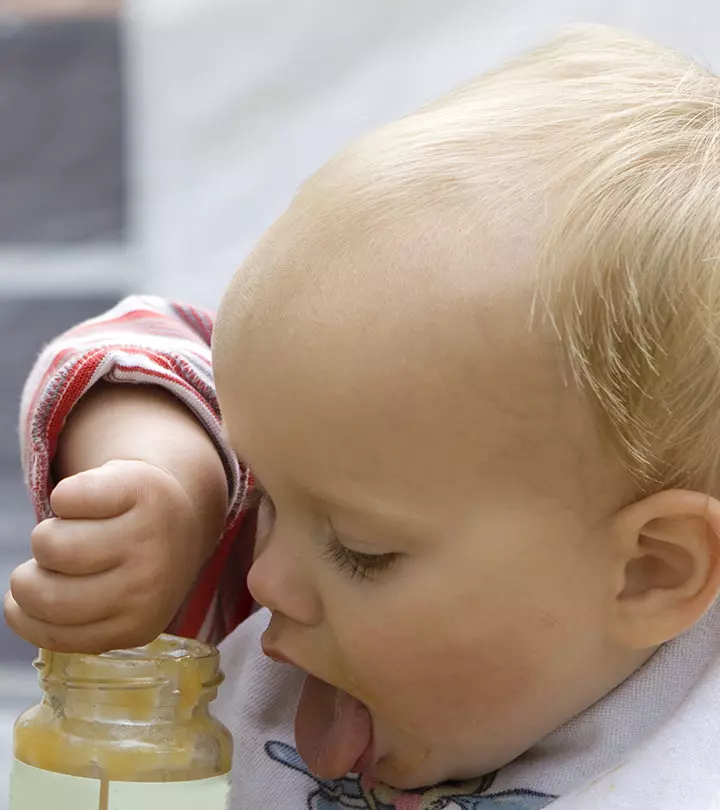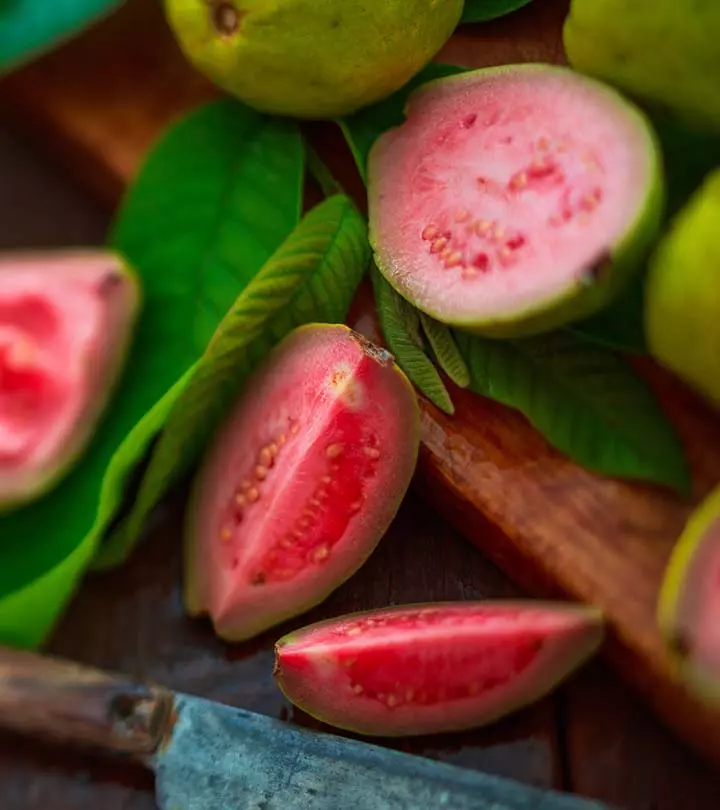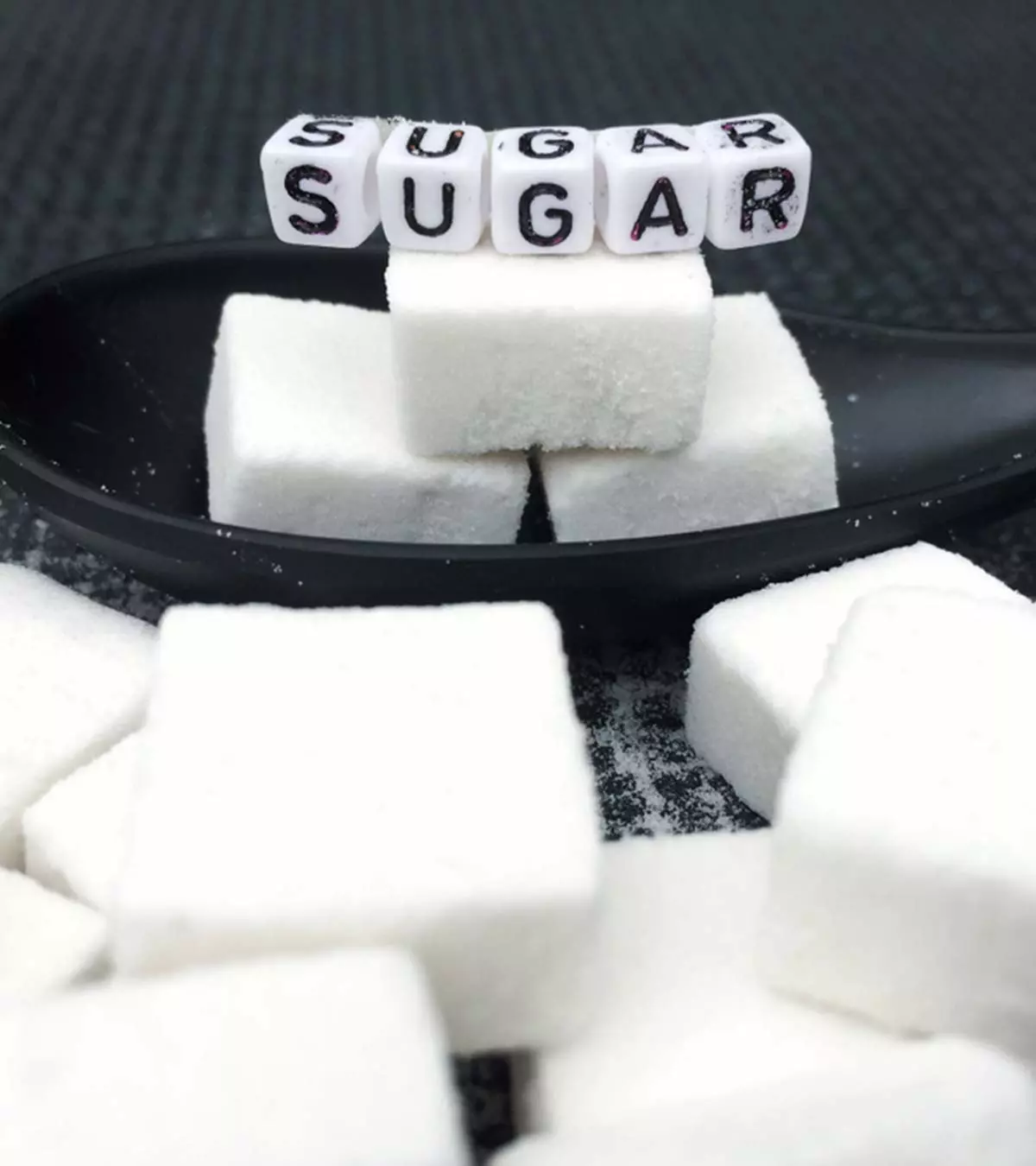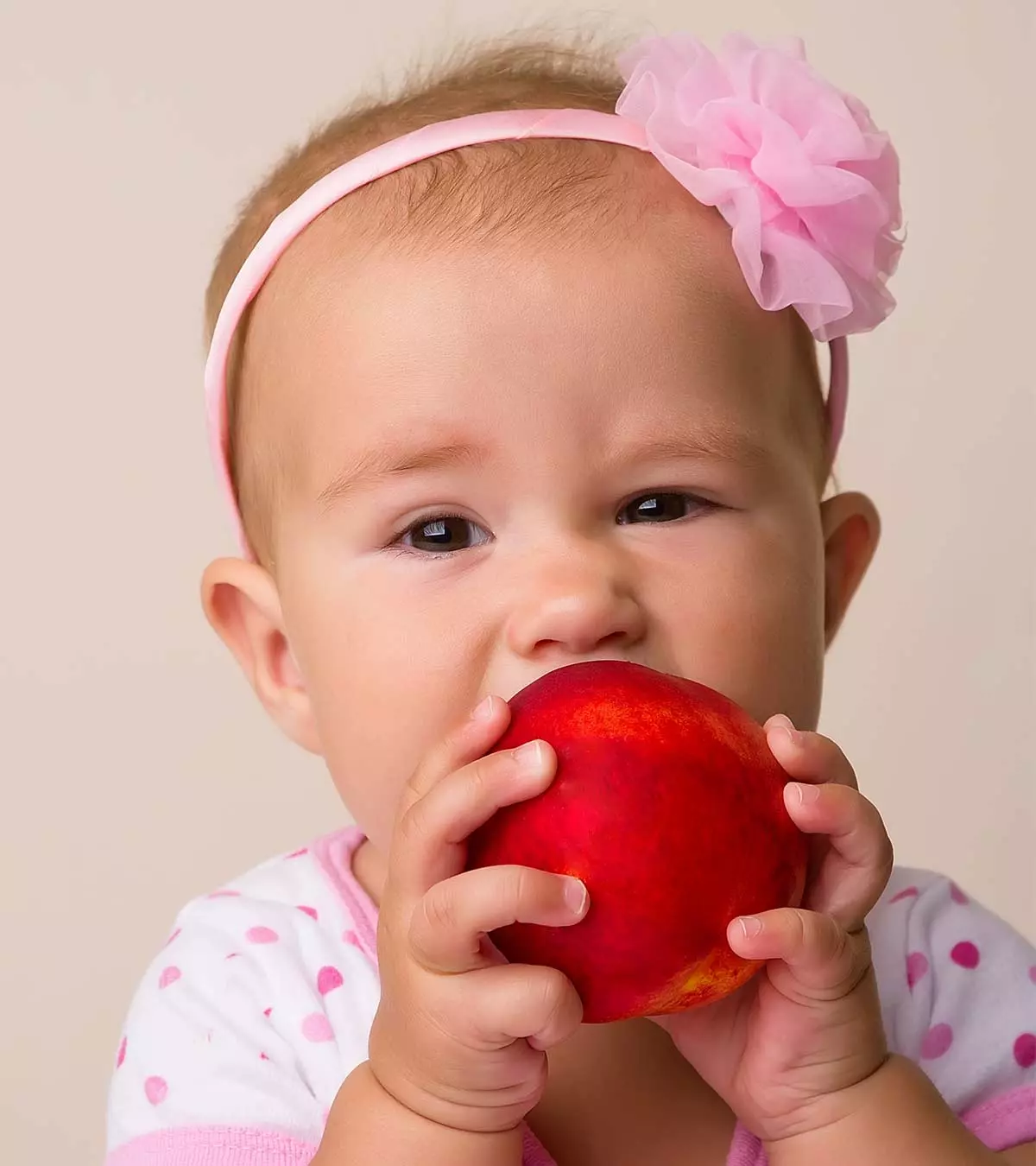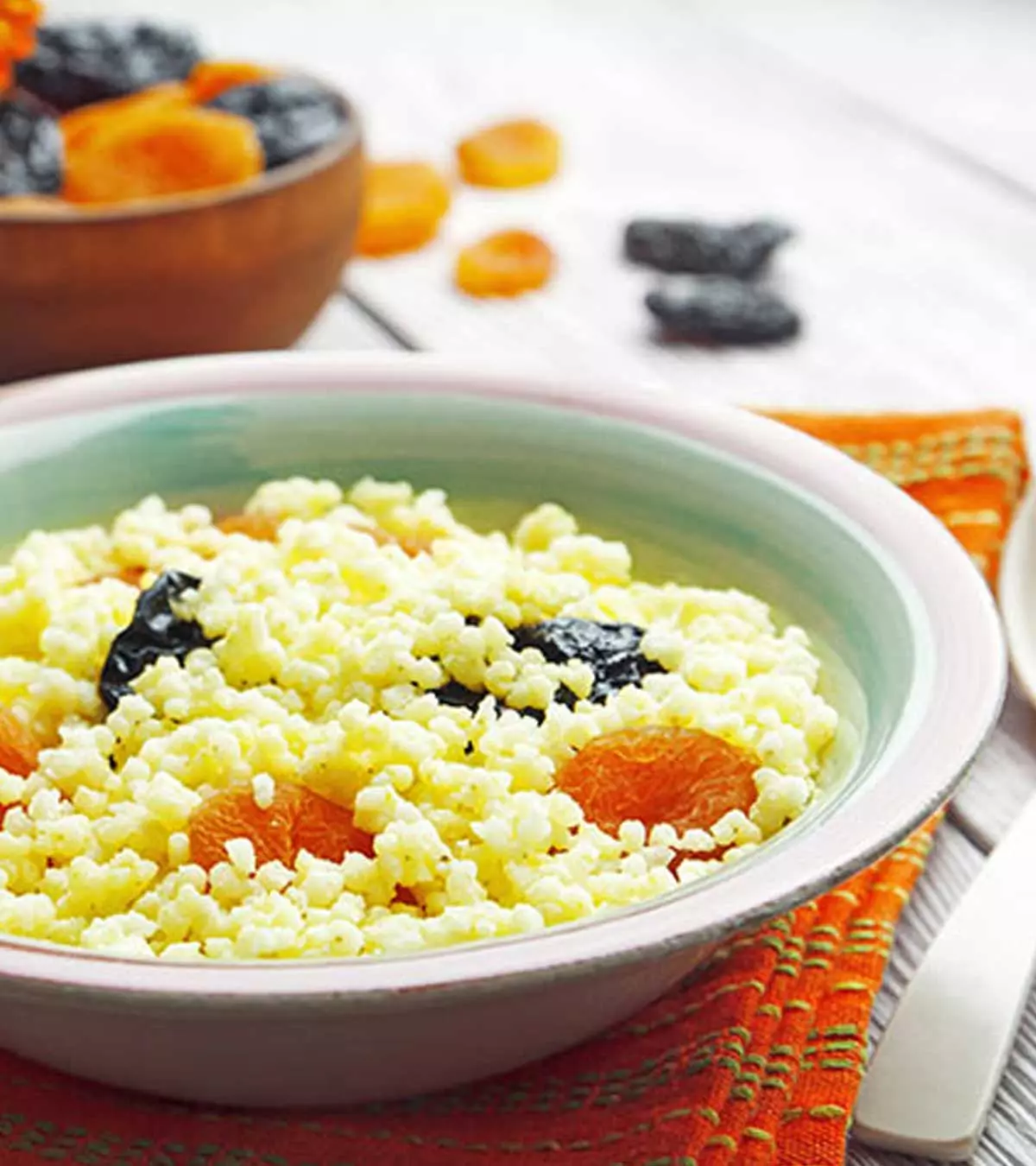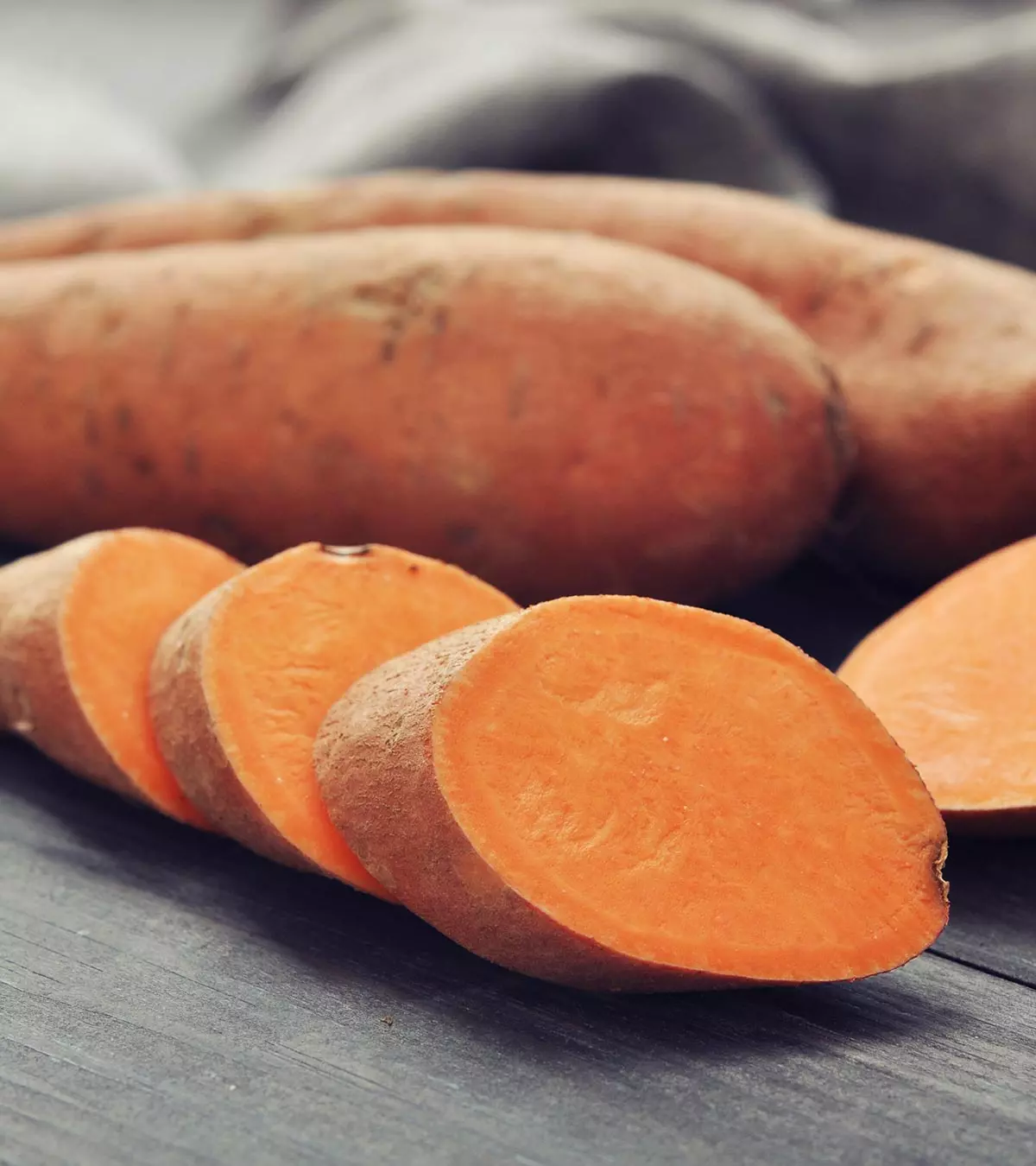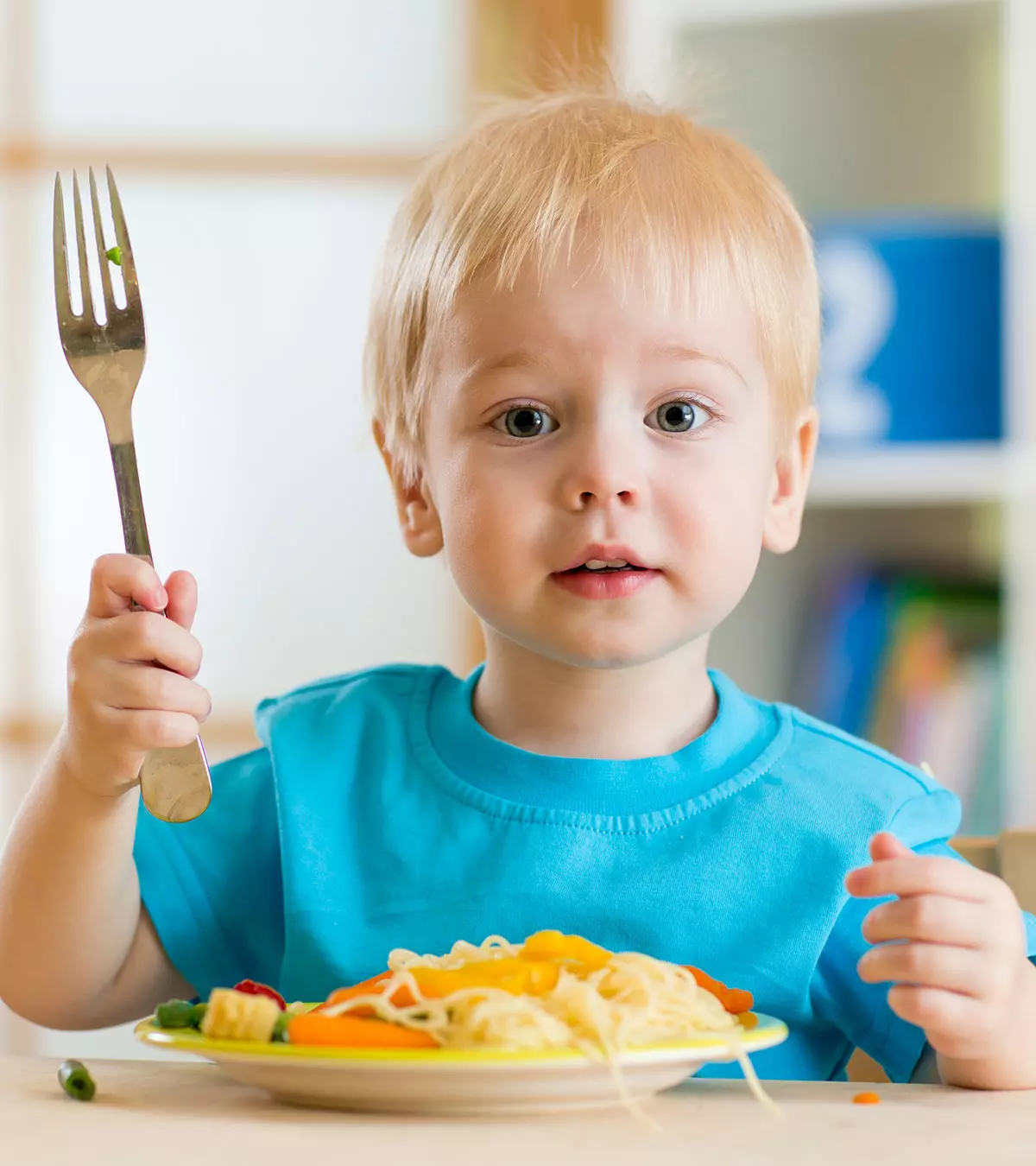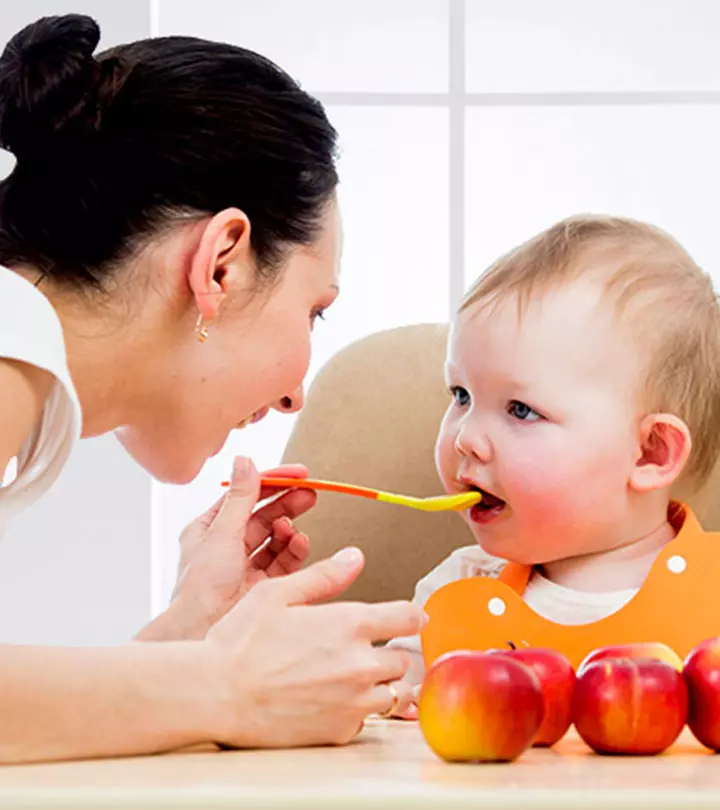
Image: ShutterStock
Apples are the most popular and nutritious fruits available throughout the year, making them an excellent choice for homemade baby food. Most parents plan to include apple puree for babies when weaning them off. Also, according to The American Academy of Pediatrics, you can use apple juice to treat the baby with constipation after their first month (1). However, you should give the whole fruit to the baby only after six months; that is when they begin eating solid foods.

Browse through this post as we discuss the right time and ways to include apples in your baby’s diet, their benefits, and safety measures to note before feeding apples to babies.
Key Pointers
- Apple puree is highly nutritious for babies.
- Apple puree can improve immunity, aid digestion, and promote overall health in babies.
- Fresh and ripe apples are best for making puree.
- Apples should be cooked, mashed, and blended well to make a smooth paste that is easy for the baby to consume.
- Fresh apple puree can be stored in an airtight container for up to 3 days in the refrigerator.
When Can Babies Start Eating Apple Puree?
Babies can start eating a variety of fruits by the age of six months (2). Therefore, you can serve apple puree or apple sauce to the baby from six months (3). Cooked and pureed form of apple is the best way to introduce the fruit. It lets babies enjoy the several health-promoting properties of apples.
According to California-based board-certified pediatrician Dr. Ellie MacGregor, “As long as your baby is at least six months old, can hold their head and trunk up well, is interested in food and isn’t pushing food out of the mouth with their tongue (the tongue thrust reflex that babies usually lose between four to six months old), then it is safe to give your baby apple puree.”
 Quick tip
Quick tipNutritional Value Of Apple With Peel
Below are the nutrients that you would find in a medium-sized whole apple (182g) and the corresponding daily requirement of nutrients (4) (5).
| Name | Amount | RDA |
|---|---|---|
| Water | 156g | – |
| Energy | 94.6Kcal | – |
| Carbohydrate, by difference | 25.1g | – |
| Fiber, total dietary | 4.37g | – |
| Sugars, total including NLEA | 18.9g | – |
| Calcium, Ca | 10.9mg | 210mg (0-6 months) 270mg (7-12 months) |
| Magnesium, Mg | 9.1mg | 30mg (0-6 months) 75mg (7-12 months) |
| Phosphorus, P | 20mg | 100mg (0-6 months) 275mg (7-12 months) |
| Potassium, K | 195mg | 500mg (0-6 months) 700mg (7-12 months) |
| Sodium, Na | 1.82mg | 120mg (0-6 months) 200mg (7-12 months) |
| Vitamin C, total ascorbic acid | 8.37mg | 30mg (0-6 months) 35mg (7-12 months) |
| Folate, total | 5.46µg | 32µg (7-12 months) |
Sources: U.S. Department of Agriculture and World Health Organization
Apple puree made with a whole apple (an apple with peel) will have almost similar nutrients, as mentioned in the table. However, the nutrients might change if you use a peeled apple to make the puree, and it will have more fiber.
How To Make Apple Puree For Babies?
This apple puree recipe is super easy to make.
You will need:
- 1 medium apple
- ½ cup water
- ¼tsp cinnamon powder
How to:
- Wash the apple under clean water.
- Peel-off the skin, remove the seeds, and dice the apple into small cubes.
- Place a thick bottom pan on medium heat and put the diced apples in it.
- Pour water to cover the apples completely. Make sure the heat is not too high.
- Cover the pan with a lid and let the apple pieces cook on simmer for about 15 minutes.
- After 15 minutes, remove the lid and see if the apple pieces are completely tender. You should be able to insert a knife through the apple pieces.
- Once you feel the apple pieces are cooked, turn off the heat and remove them from the pan.
- Use a big spoon to mash the apples completely. Put into a blender and blend to the desired consistency. You can add water to thin the puree.
- Serve it to your baby with a garnish of ground cinnamon (optional).
Tip:Once your baby is comfortable, you may try to add apple puree to cereal.
You can also try mixing apple puree to other fruit purees or to a cup of Greek yogurt. You can also cook the apples with their peels, this will increase the fiber content of the puree although it will take longer to cook and soften the peel.
Health Benefits Of Apple Puree For Babies

Apples are a great organic baby food rich in several micronutrients, dietary fiber, and phytochemicalsiBioactive compounds found in plant-based foods that act as antioxidants and have antimicrobial effects such as quercetiniA plant flavonoid that gives fruits, flowers, and vegetables their color , catechiniA phenolic compound found in specific fruits and berries, tea leaves, beans, and apricots, possessing antioxidant properties , phloridziniA substance found in some fruit trees, possessing antidiabetic and antioxidant properties and chlorogenic acid. All these phytochemicals possess strong antioxidantiSubstances that prevent cell damage caused by free radicals properties (6). Below are some specific benefits that your baby could reap by regular consumption of apple puree.
- Healthy weight: Regular consumption of apples is associated with a reduced risk of obesity. Research has shown that the positive effect of apples on weight can be observed in children as young as two years old (7).
- Gut health: Apple puree, due to its texture, is easy on the baby’s digestive system. Besides, it provides dietary fiber that helps maintain healthy gut microbiota (8).
- Immunity: Apple puree can help enhance the immune system due to the presence of micronutrients, such as vitamin C, that help enhance immunity.
- Overall health: Apple puree contains considerable amounts of essential micronutrients, such as potassium, phosphorus, sodium, and magnesium. It also contains bioactive compounds that possess antioxidants.
How To Store Apple Puree?

Babies should always be fed fresh food items. However, at times you might need to store food for later use. In such cases, simple steps, when followed right, can be helpful.
- Store fresh puree in an airtight container.
- Sterilize the container before storing the puree.
- Label the container with the date of preparation and store the puree for no more than three days.
- If you want to store the puree for a week or more, then freeze it.
- Frozen puree can be fed to babies by warming it on the stove.
Well-stored apple puree can be used for babies.
Precautions To Take While Feeding Apple Puree To Babies
- Buy organic apples as they are considered safer. Apples, in general, are known to be contaminated with pesticides such as diphenylamineiAn organic compound found in dairy, coriander, and industrial waste, possessing antioxidant properties (9).
- Use sterilized utensils to prepare and store the puree. This will ensure safety from any possible bacterial contamination.
- While preparing, ensure that puree has no lumps. Small chunks or lumps of apple pulp could be a potential choking hazard for babies.
- Never store the leftover puree in the baby’s feeding bowl as it may get contaminated with bacteria.
- As you introduce apple puree, feed just a teaspoon or two in the beginning.
- Follow a three to five-day wait rule to see if the baby is comfortable with the new food (10). If the baby is showing any signs of discomfort, then discontinue feeding apple puree.
Apple Puree Recipes For Babies
Once your baby gets used to eating mashed apple and apple puree, you can try other foods such as sweet potato, banana, oats, and pumpkin for babies. Below are some simple recipes for soft foods that use the goodness of apple puree.
1. Apple puree with sweet potato
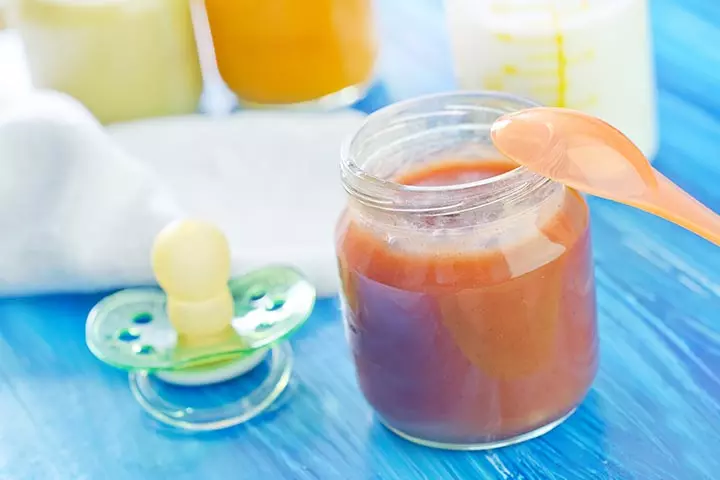
The addition of sweet potato to the apple puree can amplify the nutritional value of apple puree. Besides, this vitamin-rich food will also help provide variety to your infant.
You will need:
- 1 medium-sized apple (peeled and chopped)
- 1 small size sweet potato (chopped)
- ¼ tsp cinnamon powder
- Water
How to:
- Add the water in a pan and place it on high heat. As it starts to heat, add the apple pieces and the sweet potato pieces. Cook them until tender. Do not throw away the water in which you boiled the apples and the sweet potato. You can use it in the same recipe or use it later to prepare some other baby food.
- Blend the sweet potato and the apple pieces in a food processor to get a soft and smooth consistency. If you feel the sweet potato or the apple pieces are getting a little dry, add some boiled water.
- If your baby prefers a rough texture, you can mash the boiled sweet potatoes and the boiled apples with a spoon and feed.
Tip:
Instead of sweet potato, you can add cereal to this recipe. To experiment, you may also add cooked rolled oats or mashed brown rice to apple puree. To make it more interesting and colorful, you can add other fruits into the mix. For instance, Debjani Moitra, a mother, adds one cup of frozen or fresh blueberries into the mix. She says, “This all-fruity puree is one of baby Prisha’s (her daughter’s) favorites (i).”
 Quick tip
Quick tip2. Apple carrot puree
Carrot is a fiber-rich veggie with high amounts of vitamins A, C, and potassium. Adding carrots to apple puree is a great way to introduce your baby to different tastes.

You will need:
- 300g carrot (peeled and cooked)
- 1 red apple (de-seeded, peeled, and cooked)
- 1 cup water
How to make:
- Blend all the ingredients into a smooth puree.
- Sieve the puree using a fine mesh if needed to ensure it has no lumps.
- Transfer the puree to a serving bowl and let your baby self-feed using a spoon.
Tip
: You can replace carrots with other veggies like avocado to give this recipe a delectable twist. In addition, you can freeze the puree in popsicle molds and make healthy ice pops for your child.
3. Apple pancake
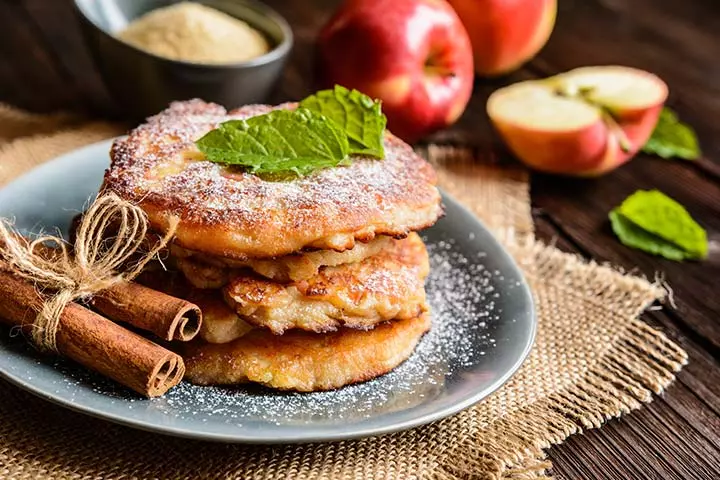
Apple pancakes are a good homemade baby food choice for once they are older than seven months. If your baby shows signs of readiness, then you can serve pancakes to your baby at the age of six months as well.
You will need:
- 1 cup multigrain flour
- 2tbsp brown sugar
- 1tbsp baking powder
- ½tsp sea salt
- ¼tsp cinnamon powder
- 1 cup whole fat milk
- ½ cup unsweetened apple puree
- Organic olive oil
How to:
- Take a flat pan and put it on medium flame.
- Meanwhile, whisk together all dry ingredients (flour, sugar, baking powder, salt, and cinnamon powder) in a bowl.
- Add milk and apple puree to the mix, and whisk again. Let the mix sit for about five minutes. Adjust the consistency of the mix or batter with water. It should be smooth but not runny or pasty.
- As the batter is ready, pour the batter onto the pan. Cook until the bottom is golden brown. Flip the pancake gently and cook the other side as well.
- Serve immediately with toppings of the baby’s choice.
Tip:
You can add dried fruit powder to this batter. It will amplify the nutritional value of the recipe multi-folds. For baby lead weaning, you can cut the pancake into bite-size pieces and offer it as finger food to the baby.
4. Blueberry apple smoothie

Smoothies are a great way to introduce babies to different fruits. This recipe contains several healthy ingredients that can contribute to babies’ nutritional needs.
You will need:
- 1 cup apple (peeled and chopped)
- 1 cup unsweetened Greek yogurt
- ½ cup unsweetened whole milk
- ½ cup frozen blueberries
How to:
- Blend all the ingredients to a smooth-flowing, lump-free fluid.
- Pour the smoothie into a cup and serve. Alternatively, you can pour the smoothie into a bowl and let your baby eat it with a spoon.
Tip
: You can add other seasonal fruits like banana, mango, and cantaloupe to this recipe. Adding a teaspoon of dried fruit and nut powder is another way to make this smoothie healthier and tastier.
5. Apple and Spinach Puree
Spinach is packed with iron and vitamins, making this puree tasty and nutritious for your baby.
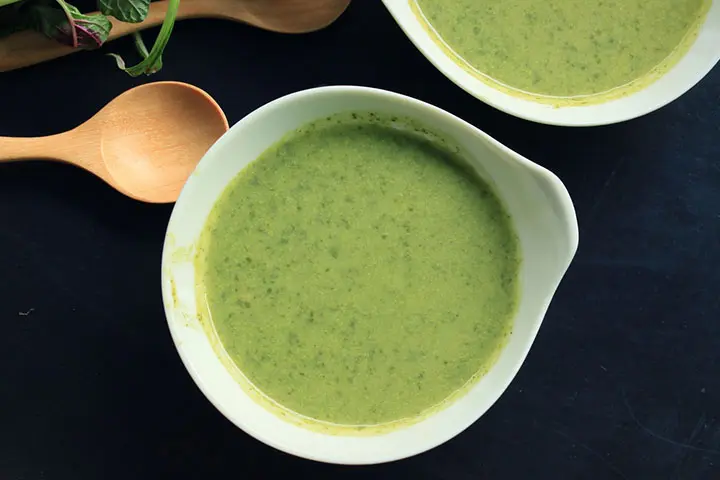
You will need:
- 1 medium apple (peeled and chopped)
- 1 cup fresh spinach (washed and chopped)
- ½ cup water
How to:
- Boil the apple pieces in water until they are tender.
- Add the spinach and cook for two more minutes.
- Blend everything into a smooth puree.
Tip
: You can also add spices such as a pinch of cinnamon, cloves, or ginger powder to the puree for extra flavor.
Frequently Asked Questions
1. How much apple puree can I give to my baby?
You can begin by giving one to two tablespoons of plain and strained apple puree once or twice a day to your four to six-month-old baby. You can give a seven-month-old baby two to three tablespoons twice a day. Once they are eight months old, you can give them two to three tablespoons of strained puree or soft mashed fruits twice daily (11).
2. Is boiled apple puree good for my baby?
Raw fruit purees for babies may be unsafe for babies as they may carry pathogens. Therefore, you could either puree boiled apples or simmer the puree at around 180oF to make it safe for babies (12). Alternatively, you can steam the apples instead of boiling them to preserve more nutrients.
3. Can I use canned apple puree instead of homemade?
It is not recommended to use canned apple puree as it may contain large amounts of added sugars and other additives (13). If you decide to use canned apple puree under any circumstance, check the ingredients and nutritional information on the label to ensure that it is safe and appropriate for your baby’s age and dietary needs.
4. Is it safe to add sugar or spices to apple puree for babies?
It is not recommended to add sugar or spices to apple puree for babies younger than one year of age (12).
5. Can my baby have apple puree if they have a food allergy?
Consult a pediatrician and seek advice before feeding apple puree to a baby with food allergies. Refrain from feeding them apple puree or any food containing apples if your baby has a known allergy to apples.
6. What are the best apples for making apple puree for babies?
The best apples for making baby puree are typically sweeter, softer, and easier to mash and digest. Gala and Fuji are some of the top recommended apples as they are naturally sweet, have a smooth texture when cooked, and are low in acidity, making them gentle on a baby’s sensitive digestive system.
Apple puree is a nutritious food that babies aged six months and above can consume as a part of their well-balanced diet. Regular consumption of apple puree in moderation can impart several health benefits to babies. However, preparing apple puree for babies in an age-appropriate way is essential to ensure they reap maximum benefits. You can feed your baby apple puree alone or add it to different fruit and vegetable purees or baby cereal to enhance the overall nutritional quality of your baby’s meal.
Infographic: Tips To Consider When Feeding Apple Puree To Babies
Apple is one of the healthiest fruits to introduce to six-month-old babies as they start eating solids. However, to ensure that babies are receiving all the nutrients from apples, you should take a few precautions. Check out the infographic below to learn some valuable feeding tips.
Some thing wrong with infographic shortcode. please verify shortcode syntax
Unlock the secrets of preparing a delightful and nutritious apple puree perfect for babies aged 4-8 months. This homemade recipe is both effortless and guaranteed to win over your little one’s taste buds.
Personal Experience: Source
MomJunction articles include first-hand experiences to provide you with better insights through real-life narratives. Here are the sources of personal accounts referenced in this article.
i. Apple blueberry puree;https://lifewithoutalu.blogspot.com/2025/07/apple-blueberry-puree.html
References
1. Infant Constipation; Healthy Children; American Academy of Pediatrics
2. Starting Solid Foods; Healthy Children; American Academy of Pediatrics
3. baby’s first foods; Queensland Government
4. Apples, raw, with skin; USDA
5. Feeding and nutrition of infants and young children; WHO
6. Jeanelle Boyer and Rui Hai Liu; Apple phytochemicals and their health benefits; National Center For Biotechnology Information
7. Carol E. O’Neil et al.; Consumption of apples is associated with a better diet quality and reduced risk of obesity in children: National Health and Nutrition Examination Survey (NHANES) 2003–2010; National Center For Biotechnology Information
8. 5 Health Benefits Of Apples; The Art Of Living Retreat Center
9. Apples Doused With Chemical After Harvest; EWG
10. When, What, and How to Introduce Solid Foods; CDC
11. Feeding Guide for the First Year; Stanford Children’s Health
12. Making Your Own Baby Food; Clemson University
13. Infant Feeding Guide; University of Rochester Medical Center
14. Apple Facts You Need To Know About: Benefits, Concerns, & the Best Ways to Enjoy Them; Food Revolution Network
Community Experiences
Join the conversation and become a part of our nurturing community! Share your stories, experiences, and insights to connect with fellow parents.
Read full bio of Moloko Mehlape
- Dr. Ellie Macgregor has over 16 years of experience as a board-certified pediatrician. She graduated from The University of Arizona Andrew Weil’s Center for Integrative Medicine and underwent pediatric training at Nicklaus Children’s Medical Center in Miami, Florida. Dr. Macgregor continued her education at Kansas City University’s osteopathic medical schools, the Institute of Functional Medicine, and the Kresser Institute for Functional and Evolutionary Medicine.
 Dr. Ellie Macgregor has over 16 years of experience as a board-certified pediatrician. She graduated from The University of Arizona Andrew Weil’s Center for Integrative Medicine and underwent pediatric training at Nicklaus Children’s Medical Center in Miami, Florida. Dr. Macgregor continued her education at Kansas City University’s osteopathic medical schools, the Institute of Functional Medicine, and the Kresser Institute for Functional and Evolutionary Medicine.
Dr. Ellie Macgregor has over 16 years of experience as a board-certified pediatrician. She graduated from The University of Arizona Andrew Weil’s Center for Integrative Medicine and underwent pediatric training at Nicklaus Children’s Medical Center in Miami, Florida. Dr. Macgregor continued her education at Kansas City University’s osteopathic medical schools, the Institute of Functional Medicine, and the Kresser Institute for Functional and Evolutionary Medicine.
Read full bio of Swati Patwal
Read full bio of Rohit Garoo
Read full bio of Vidya Tadapatri







